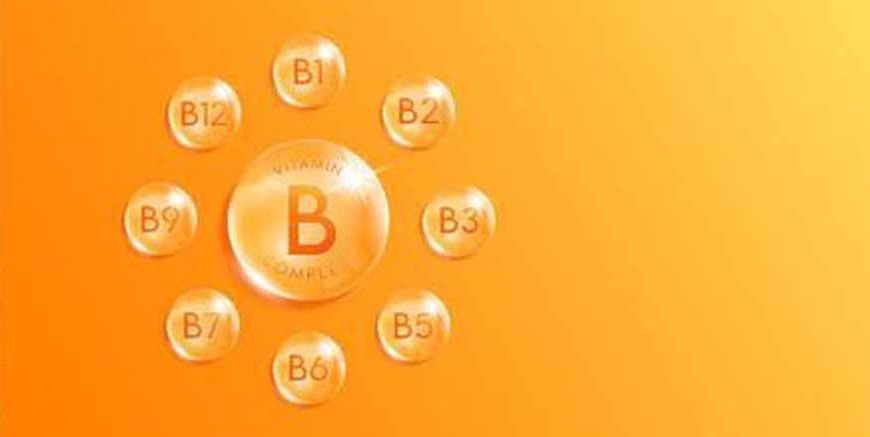The group of eight vitamins known under the name vitamin B is very useful and necessary in the correct functioning of the human body. These water-soluble vitamins need to be consumed daily for such basic functions as generating energy, every aspect of thinking, to the mundane as cell division. Okay, here is what we know – the specifics of B-vitamins and B-vitamins effects, uses, significance and availability.
Table of Contents:
- Vitamin B benefits.
- Uses of Vitamin B.
- Importance of Vitamin B.
- Vitamin B Health Benefits.
- Sources of Vitamin B.
- References.
Vitamin B Benefits
The B-vitamin complex offers a wide array of benefits that contribute to our overall health: As for the potent effect of the B-vitamin complex, it can be underlined that this compound has numerous positive impacts which preserve and improve our general condition.
- Energy Boost:
- Brain Power:
- Increased Blood:
- Healthy & Clear Skin:
- Mood Regulation:
Metabolism vitamins are B-vitamins and include B1, B2, B3 and B5 vitamins in dietary ingredients. They help in the digestion of proteins, lipids, and carbs, which provide the body’s cells and cells in general power.
Some of these are vitamin B12, B6 and B9 (folate) that are very vital for the overall health of the brain. It is involved in the production of the sheath of myelin that covers nerve cells; the production of neurotransmitters also takes place here. It also may have some positive benefits for slowing down the rate of the age-associated loss of brain function.
Red blood cells are increased in the body so that oxygen can be delivered to a young human lacking B12 and folate.
Biotin (B7) — it’s great for skin, hair, nails too cause biotin is in the making of keratin.
Twelve of them have B-vitamins that assist the body in making feeling-regulating substances for your feelings.
Uses of Vitamin B
The versatility of B-vitamins makes them useful in various contexts:
- Dietary Supplements:
- Medical Treatments:
- Food Fortification:
- Sports Nutrition:
- Stress Management:
- Pregnancy Support:
This vitamin is commonly taken as a B-complex supplement as it is used in management of deficiencies and health in general.
Some of B-vitamins for instance are used for treating specific disorders. For example, high-dose B1 will cure Wernicke-Korsakoff syndrome and the same B12 injections will cure pernicious anemia.
Most commercially available processed foods are actually ‘enriched’ with the B-vitamins in order to eliminate deficiency amongst the populace.
Because B vitamins improve energy metabolism and muscular function, bodybuilders and athletes utilise them.
Because B-complex vitamins help the neurological system, they are often advertised as a means of reducing stress.
To lower the incidence of neural tube abnormalities in developing fetuses, pregnant women are advised to take folic acid (B9).
Importance of Vitamin B
Understanding why B-vitamins are crucial can help us appreciate their role in our health:
- Metabolic superstars:
- Supporters Of the Nervous System:
- DNA Dynamos:
- Immune Boosters:
- Mood Modulators:
B-vitamins participate in a number of catalytic mechanisms within metabolism, exemplifying the essential positions B vitamins hold when it comes to cells and energy establishment.
These vitamins are essential for the normal functioning and integrity of both central nervous system (brain) as well peripheral nerves.
Some of the B-vitamins which are vital include folate and B12 and they play a critical role in DNA synthesis and cell division for growth and repair.
B-vitamins help in various points of the immunity and thus, assist in the fight against infections and diseases.
B-vitamins bring into the formulation neurotransmitters mind controlling thus have an influence on mental state of health.
Vitamin B Health Benefits
The specific health benefits of B-vitamins are numerous and varied:
- Preventing Birth Defects:
- Cognitive Protection:
- Energy Enhancement:
- Mood Improvement:
- Skin & Hair Health:
- Cardiovascular Support:
A reasonable amount of folate taken both before and throughout pregnancy can help reduce the incidence of neural tube defects in newborns.
Studies have indicated that some nutrients, such as the vitamin B-complex, particularly vitamin B12, may help preserve memory and maybe even lower the risk of dementia.
Due to their involvement in energy metabolism, B vitamins may be useful in the fight against fatigue and low energy.
Several of the investigations have indicated that B-vitamin supplementation might be of useful in treating signs of depression and anxiety in some persons.
Vitamin Biotin –Other groups of B-vitamins are also important for skin and hair health that may minimize appearance, acne, redness in the region which can reduce signs related to aging.
B-group vitamins and particularly Vitamins B6,B9, and 12 are involved in the production of red blood cells, white blood cell replication as well as homocysteine metabolism which might have beneficial effects on heart health.
Sources of Vitamin B
A varied diet that is rich in the following foods can help guarantee enough intake of the vitamin and its family:
- Animal products:
- Whole Grains:
- Leafy Greens:
- Nuts and seeds:
- Fortified foods:
- Nutritional yeast:
For instance, meat, eggs, fish, and dairy are perfect examples of some types of food which pack a lot of B vitamins, particularly B12 found almost exclusively in animal flesh.
B-vitamins such as niacin, thiamine among others are seen in whole wheat, brown rice and many more.
Spinach is a dark green vegetable that contains folic acid as well as other B vitamins.
Almonds, sunflower seeds together with other varieties have several types of b vitamins such as niacin and folate respectively.
There are sources which include breakfast cereals, breads plus plant-based milk alternatives fortified with a myriad of vitamin Bs.
This deactivated yeast is a popular vegan source for vitamin Bs including fortified forms containing vitamin B12
B-vitamins are therefore essential constituents necessary for normal body functioning. They also contribute to overall health as they help in energy production and ensure proper brain functions. By understanding how these nutrients function, what benefits accrue from their intake and where we can get them, it is possible to choose the right foods or supplements that contain enough quantities.
For more such interesting blogs, Visit EuroKids
















